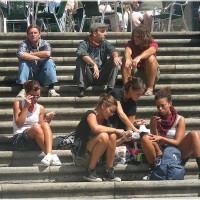Blog
Compostela blues: how affect the Camino to our state of mind?
This blog and many others fill pages about the experiences treasured in the Camino de Santiago: there is the contact with nature; the pleasure of living for days in different climates, landscapes and food flavors; the satisfaction of meeting a goal despite the penalties and, above all, the feeling of belonging to a community that preface in space and time, one self dissolves in the pilgrim-being and the changing role remains installed beyond Obradoiro, Botafumeiro or Finisterre and Muxía. You know when you start wandering but what is left behind when we went to the pilgrim? It seems a superficial issue but there are few that speak of post-Camino blues so the question arises: How does our spirit remains after doing the Camino de Santiago?
The blues feeling that some pilgrims claim to feel after completing the Way could be explained by the same reasons as anyone feel a little mental letdown when your vacation is finished and you must return to the routine, but perhaps it's a more intense feeling because the sense of rootlessness felt after make the way: the idea of achieving a goal, to reach the next stage and discover there a new place, to be part of a new community and be integrated into a new being and open perspective that can meet new people every day have a severe counterpart when the pilgrimage is completed.
Because you suffer when you realize that there is nothing to do beyond the routine, no place to go, which is outside the community to which they belong and is not so easy to meet new people.
This feeling of emptiness does not have to be too intense but it is common enough to be a regular item on the forums dedicated to the Camino de Santiago. Even specialized in the pilgrimage route writers have stopped to analyze this phenomenon and try to explain it.
Is the case of Sue Kenney, Canadian and vocational pilgrim author more than ten years ago began organizing a small meeting for foreigners in Santiago de Compostela pilgrims to share the emotions and feelings that crowded after many days of effort, the mind on a goal that was shared by most people who passed along the day.
The emptiness was not so overwhelming because Santiago, the goal is still present but gradually, pilgrims they realized they had left behind an experience that transcends the days or weeks they thought devoted to complete the Road Santiago. The idea that the pilgrimage route was installed in them was stronger as the hours passed in Compostela and increase as verifications heading home.
While it not is trying to establish medical categories to psychological phenomena that can be explained as uprooting, testimony that was accumulating Sue Kenney bared the idea that the Pilgrim goes beyond mere walk path or spiritual aspirations at first. It is an experience that changes the mood and that change is palpable almost immediately.
The Afterway Space in Fórum Fairway also devote time to discuss this little post-Way downturn but we are looking forward to reading your opinions.
Really exist this Compostela blues?
